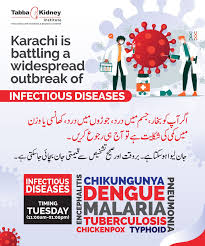Karachi, Pakistan’s bustling port city, has been grappling with a surge in Chikungunya cases since May this year. Hospitals are overwhelmed with daily reports of suspected cases, raising significant health concerns. Let’s dive into what Chikungunya is, how it spreads, and the severity of the situation in Karachi.
What is Chikungunya Virus?
How Does It Spread?
Chikungunya is a mosquito-borne viral disease transmitted primarily by the Aedes aegypti and Aedes albopictus mosquitoes. When an infected mosquito bites a person, the virus enters their bloodstream. If a non-infected mosquito bites an infected individual, it becomes a carrier and can spread the virus to others.
According to health experts, the risk of transmission is highest during the first week after infection. These mosquitoes also transmit other dangerous viruses, including dengue and Zika.
Chikungunya in Karachi: How Severe is the Outbreak?
Rising Numbers of Cases
From May to September 2024, Karachi reported 172 confirmed cases of Chikungunya and 956 suspected cases, according to the Sindh Health Department. Of these, 713 individuals were tested.
Vulnerable Groups
Aga Khan University Hospital reports show that elderly individuals and diabetic patients are particularly at risk of severe complications from Chikungunya.
Symptoms of Chikungunya
Common Symptoms
Symptoms typically appear 3–7 days after being bitten by an infected mosquito. These include:
- Fever
- Joint pain
Other Symptoms
- Headaches
- Muscle pain
- Joint swelling
- Rashes on the body
Timeline of Symptoms
- Rashes: Appear 2–3 days after infection and last 7–10 days.
- Joint Pain: Can persist for months, even after recovery from other symptoms.
Misdiagnosis Risks
Chikungunya’s symptoms overlap with those of dengue and Zika, often leading to misdiagnoses.
Vaccination Status: Is Prevention Possible?
Available Vaccines
The U.S. Food and Drug Administration (FDA) has approved a single-dose vaccine, IXCHIQ, for people aged 18 and above. However, WHO has not yet authorized this vaccine, and Pakistan adheres to WHO guidelines. This means no vaccines are currently available in Pakistan.
Preventing Chikungunya
Avoiding Mosquito Bites
- Use mosquito repellents.
- Wear long-sleeved clothing.
- Sleep under mosquito nets.
Eliminating Mosquito Habitats
- Remove stagnant water from your surroundings.
- Clean water containers regularly.
- Keep garbage covered to avoid attracting mosquitoes.
The Broader Impact on Karachi
Healthcare System Strain
Hospitals are struggling to manage the influx of patients, highlighting the need for better healthcare infrastructure and resources.
Economic and Social Impact
The rise in cases affects daily life, as individuals are forced to miss work and healthcare costs rise for families.
Conclusion
Chikungunya is a growing health challenge in Karachi, emphasizing the need for awareness, prevention, and improved public health strategies. While no WHO-approved vaccine exists yet, preventive measures like mosquito control and public education can help reduce the spread of the disease.
FAQs
1. What are the early signs of Chikungunya?
Fever and joint pain are the most common early symptoms.
2. Can Chikungunya be cured?
There is no specific cure, but symptoms can be managed with pain relievers and rest.
3. How can I protect myself from Chikungunya?
Use mosquito repellents, wear protective clothing, and eliminate stagnant water around your home.
4. Is Chikungunya fatal?
It is rarely fatal, but it can cause severe complications in vulnerable groups, such as the elderly and those with chronic conditions.
5. Why is Karachi experiencing a surge in cases?
Poor mosquito control and a lack of awareness contribute to the increasing number of cases in the city.


